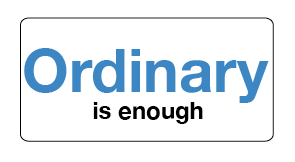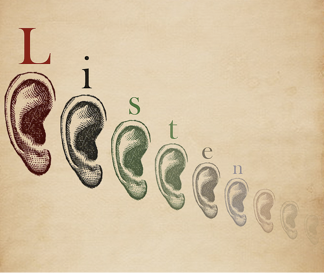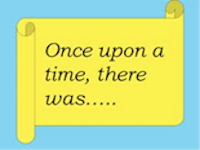Everywhere we turn we are immersed in a world that tells us we must be bold, stretch beyond our limits, do whatever it takes to be an extraordinary person living an extraordinary life. If we don’t, we’re doing ourselves a disfavor, selling ourselves short.
 The zen teachers say the way to enlightenment is to “chop wood and carry water.” I’ve given this considerable thought over the last months, and I’ve come to understand something:
The zen teachers say the way to enlightenment is to “chop wood and carry water.” I’ve given this considerable thought over the last months, and I’ve come to understand something:
If you can’t find peace in the ordinariness of your everyday life, you won’t find it by moving to Tahiti, buying a new sports car, or trading in your current spouse for a new one.
This understanding has three parts:
Part 1: Ordinary is Enough.
I’m happy to “be” an ordinary woman, going about my “ordinary” day – tending to my body, mind, spirit, and family in ordinary ways, practicing ordinary tasks and processes in my business. I’m content with who I am and what I do, and am, these days, striving to simplify in any way I can. It is amazing how little we really need.
Part 2: Ordinary is Not Boring.
Giving ourselves over to the ordinary – to washing dishes, changing sheets, mowing the lawn – brings moments of release and realization. Years ago I wrote a blog post titled “My Now and Zen Kitchen” that speaks to this phenomenon. Slowing down, stripping away the noise of advertising and the pressure of keeping up with the latest whatever, brings a level of peace and calm that is anything but boring – this is the space where creativity brews and thrives!
Part 3: Ordinary People can and do live Extraordinary Lives.
There is no contradiction in this statement. When we are content with what we have and do, when we are no longer striving for more or bigger or better, our energy patterns change, opening the door to our dreams – and beyond that door is where extraordinary things happen.
How do you get to a place inside where Ordinary is enough? Can you spare five minutes? Oh, yes, you can.
Sometime today, take yourself to a place where you can be undisturbed – even if you have to leave the office to sit in your car. Sit still and quiet for 5 minutes, focusing on your breathing. As thoughts bubble up – the distractions of “this is stupid, you should be doing…” let them go. Stay focused on your breath. Breathe in, breathe out, breathe in, breathe out. When your mind wanders, and it will, just be aware of it and go back to breathing in, breathing out.
If the car thing isn’t your thing, forgo the dishwasher and wash your plates and pans by hand. Focus on the motion – that “soap on, soap off” motion. Feel the slipperiness of the suds on your hands, see yourself washing away the leftovers and scraps of your day.
As you continue to find ways to slow down and let the ordinary things of life be enough – even if it is just for five minutes at a time, your life will change.
I’d love to hear your thoughts on this topic, and your experiences!


 Having one of those days, darling? You know what I mean – one of those frustrating, exhausting days in which everything you had planned is blown out the window by the things you didn’t anticipate?
Having one of those days, darling? You know what I mean – one of those frustrating, exhausting days in which everything you had planned is blown out the window by the things you didn’t anticipate? 1) Focus on the Goal of your Blog. Is your intent simply to keep your name Top of Mind with your customers and prospects? Are you focused on Lead Generation, website traffic, or building your reputation as an information hub?
1) Focus on the Goal of your Blog. Is your intent simply to keep your name Top of Mind with your customers and prospects? Are you focused on Lead Generation, website traffic, or building your reputation as an information hub? 2) Remember What Drew You to Your Industry. Way back when, on the day you started your company or made the decision to take a job in your current industry, you were excited about it. There was something that thrilled you, that satisfied you beyond just the paycheck. What was it? What emotion did it trigger? Find that energy again, and write from that place. It might be helpful to create a list of the reasons you started and the dreams you had about your career.
2) Remember What Drew You to Your Industry. Way back when, on the day you started your company or made the decision to take a job in your current industry, you were excited about it. There was something that thrilled you, that satisfied you beyond just the paycheck. What was it? What emotion did it trigger? Find that energy again, and write from that place. It might be helpful to create a list of the reasons you started and the dreams you had about your career. 3) Tell stories. Stories pull the reader into an experience, and the more they see themselves in that experience, the more willing they will be to keep reading and remember you when they need your product or service.
3) Tell stories. Stories pull the reader into an experience, and the more they see themselves in that experience, the more willing they will be to keep reading and remember you when they need your product or service.